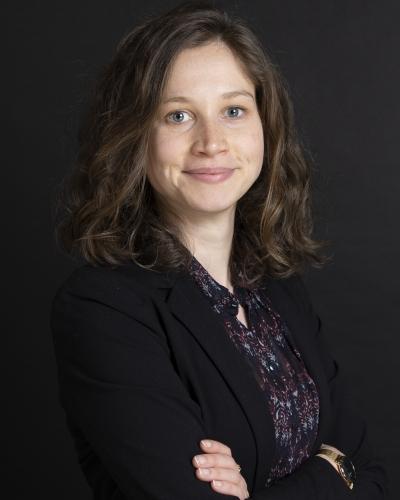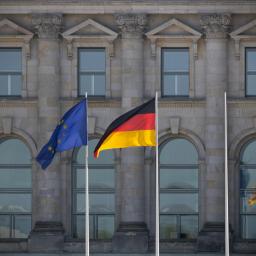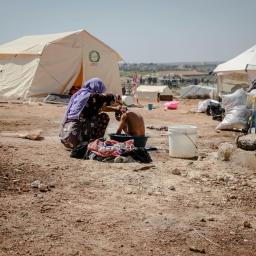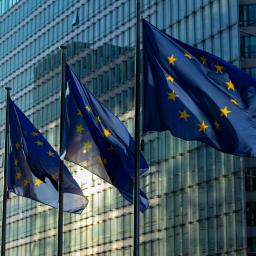From 6 to 9 June, Europe goes to vote for a new European Parliament. In the run-up to the European elections, we will bring you an LDE series on several key topics in the coming weeks.
 Christina Toenshoff's research focuses on climate and environmental politics and policy. She focuses on the role of interest groups and examines how companies and associations lobby the European Union on climate issues. Toenshoff closely follows the run-up to the elections. The associate professor stresses the importance of the elections and the need to vote next month. ‘There is a lot at stake. Many issues the European Parliament is about affect our lives. Whatever the outcome of the elections, it will affect all citizens anyway.’
Christina Toenshoff's research focuses on climate and environmental politics and policy. She focuses on the role of interest groups and examines how companies and associations lobby the European Union on climate issues. Toenshoff closely follows the run-up to the elections. The associate professor stresses the importance of the elections and the need to vote next month. ‘There is a lot at stake. Many issues the European Parliament is about affect our lives. Whatever the outcome of the elections, it will affect all citizens anyway.’
Measures are making an impact
and combat climate change. This plan was presented by the European Commission led by Ursula von der Leyen in 2019. Priority of the plan: reducing greenhouse gas emissions. Left-wing groups in the European Parliament in particular support the Green Deal, while right-wing groups, especially the far right, prefer to water down the climate plans. Looking at the pre-election polls, you can see that - as in many individual EU countries - a right-wing wind is blowing in Europe too. What does this mean for the Green Deal and the implementation of those plans?
I do not expect major changes in environmental and climate policy.'
Toenshoff is positive: ‘When the plans were launched in 2019, a 55 per cent reduction in greenhouse gas emissions was set for 2030. Much of that legislation to reduce and green emissions by 2030 has already been passed. That's the good news; those measures have already been adopted and will continue to work for some time and thus have an impact. I do not expect major changes in environmental and climate policy, but rather minor adjustments.’
Climate plans weakened in right-wing parliament
The less good news, according to the scientist, is that the new parliament will soon set policy targets for 2040. The EU has already recently revealed that the 2040 greenhouse gas reduction rate is at the lower end of its previously stated ambitions. Toenshoff: ‘The thorny issue is that the biggest sector to be made CO2-free is the agricultural sector. We all know how sensitive that is. The farmers' protests in the various EU countries as well as in Brussels are certainly having an effect. I expect that if the polls become true and we get a more right-wing parliament, the 2040 targets will be watered down.’
Climate high on agenda
Toenshoff is happy that climate change remains high on the agenda. ‘In opinion polls, you can see that climate remains an important issue for voters. In the previous elections, the ‘green shift’ was made by voters under the age of 40. If this trend continues this year, I am certainly hopeful for the future. Concerns about the climate and our future resonate with my generation. I am 31 years old and count myself among that young generation. I hope to live a long time and will experience the consequences of climate change myself. These could be severe if we don't take action. I see it as one of the biggest challenges in our lives.’
Young generations are worried about their future and want to fight for this. You do the same by voting on 6 June.’
The younger you are, the longer you have to live with the consequences of the policies that will soon be made by the European Union. ‘That is why I am also optimistic that the main goals will remain intact. You won't be thanked if you start reversing climate and environmental policies. Young generations are worried about their future and want to fight for this. You do the same by voting on 6 June.’
Using knowledge that is in-house
According to Toenshoff, it is important to organise events at universities and in the LDE context on the importance and implications of the European elections. ‘Not only to inform our students, but also to show a wider audience what knowledge we have in-house. I am also thinking of events after the elections in which we can play a role. We have so much expertise within LDE about how policy is made, and I am also thinking of centres such as BOLD cities and the centre for Sustainability. We have the knowledge, so let's showcase it.’
Text: Margriet van der Zee
Photo cover: pexels artstel
European elections: impact for social issues
Leiden-Delft-Erasmus Universities is paying attention to current themes in the run-up to the European elections. What is the influence of the EU on these issues, now and in the future? From different disciplines, scientists shine their light on this. Until June 6, 2024, 6 interviews will appear from Leiden University, TU Delft and Erasmus University Rotterdam. Follow the series via this site and via LinkedIn of Leiden-Delft-Erasmus Universities.




